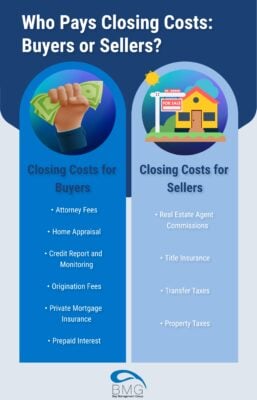 Whether you’re buying or selling real estate, it’s crucial to know the various expenses involved. While you may assume that the buyer pays the majority of all closing costs, that’s not necessarily true. Today, we’ll review who pays closing costs and which expenses the buyer and seller are each responsible for.
Whether you’re buying or selling real estate, it’s crucial to know the various expenses involved. While you may assume that the buyer pays the majority of all closing costs, that’s not necessarily true. Today, we’ll review who pays closing costs and which expenses the buyer and seller are each responsible for.
Contents of This Article:
- What Are Closing Costs?
- Who Pays Closing Costs?
- How Much Are Closing Costs?
- How to Reduce Closing Costs
- Protect Your Properties With BMG
What Are Closing Costs?
Closing costs are fees and expenses associated with finalizing a real estate transaction, typically the purchase or sale of a home. As the name suggests, these fees are paid at the closing of a transaction and may include lender fees, property taxes, title insurance, and more.
Both buyers and sellers need to know what closing costs they’re responsible for. Both parties usually pay some type of closing costs, and the amount can vary. Typically, it depends on the price of the home, the type of mortgage the buyer chooses, the location of the property, and more.
Today, we’re going over what costs buyers and sellers pay, how much they typically pay, and how to reduce these costs during a sale.
Who Pays Closing Costs?
Who pays closing costs when a property is bought or sold? Both buyers and sellers do! However, the costs they’re responsible for differ and may depend on certain factors, including the following.
- Type of Home Loan- The type of home loan can influence who pays what in closing costs. For instance, in a conventional loan, buyers may be responsible for a larger portion of the closing costs. On the other hand, the seller may cover more of these costs for VA or FHA loans.
- Buyer’s vs. Seller’s Market- Market conditions can also impact who pays closing costs. In a buyer’s market where there are more homes for sale than there are buyers, sellers may offer to cover some closing costs to make their property more attractive. However, in a seller’s market where demand exceeds supply, buyers may have less negotiating power, and sellers may be less inclined to offer closing costs.
- Seller Concessions- Seller concessions are closing costs that the seller agrees to pay, which can be negotiated as part of the sales contract. Sellers typically offer concessions to incentivize buyers or to ensure a smoother transaction. However, there may be limits on the amount of concessions depending on the loan type and lender requirements.
Ultimately, while each situation is different, closing costs can often be negotiated between the buyer and seller.
How Much Are Closing Costs?
The amount that buyers or sellers may pay in closing costs varies depending on the location, loan type, and other factors. That said, closing costs, on average, cost homebuyers around 2% to 5% of the home’s sale price. Sellers, on the other hand, may pay higher costs, ranging from 6% to 10% of the home’s price. Let’s go over some of the major expenses for both parties.
Common Buyer Closing Costs
Homebuyers cover several costs at closing, including one-time fees like appraisal and home inspection fees, loan origination fees, and taxes. Additionally, there are plenty of ongoing costs, like taxes, private mortgage insurance (PMI), and more. Here are some of the costs buyers can expect to pay.
- Attorney Fees- Depending on where you’re located, you may be required to hire an attorney to help oversee the closing process. However, even if it’s not required, buyers may want to work with one to understand the complexities of the home-buying process. The costs for an attorney may vary, but you can expect either a flat or hourly rate.
- Home Appraisal- Lenders typically require a home appraisal as part of the mortgage application process. That said, the typical cost for a single-family home appraisal is around $500.

- Credit Report and Monitoring- Lenders need to pull your credit report to process your real estate loan, which can cost anywhere from $30 to $50.
- Origination Fees- Lenders typically charge origination fees to cover the costs of processing and underwriting your mortgage. Buyers can expect to pay 0.5% to 1% of the mortgage price.
- Private Mortgage Insurance- When buyers put less than 20% down on a conventional mortgage, they’ll likely have to pay private mortgage insurance (PMI). You can either pay it monthly along with your mortgage payment or pay it upfront to lower your monthly payments.
- Prepaid Interest- Prepaid interest is the amount paid upfront by the buyer between the closing date and the first mortgage payment.
Common Seller Closing Costs
While buyers may have more individual expenses, sellers have their fair share of closing costs to pay. Here are some of the typical closing costs for sellers.
- Real Estate Agent Commissions- Sellers usually pay commissions for both agents involved in the real estate transaction, both for their own and their buyer’s. This is one of the larger costs for sellers, usually around 6% of the home’s purchase price.
- Title Insurance- Title insurance is important for protecting the home buyer and lender from any potential damages, outstanding liens, or unpaid taxes on the title. While the buyer typically purchases title insurance, it’s usually paid for as part of the seller’s closing costs.
- Transfer Taxes- Transfer taxes cover the cost of transferring ownership from the seller to the new owner and can be paid by either party.
- Property Taxes- Depending on when the property is sold, taxes are usually split between the buyer and seller. For instance, sellers pay a percentage of the tax cost up to the sale date, and buyers are responsible for covering the rest of the year.
 How to Reduce Closing Costs
How to Reduce Closing Costs
Closing costs easily add up for both buyers and sellers. However, there are some steps each party can take to help reduce these costs while buying or selling a property.
For instance, if you’re a homebuyer looking to get a mortgage loan, ask about expenses and fees that will affect the cost of your loan. You’ll want to shop around and get multiple loan offers, and don’t forget to negotiate. Additionally, you can request seller concessions and negotiate for them to pay more of the closing costs.
On the other hand, sellers can save on closing costs by negotiating certain fees, like real estate agents’ commissions. These fees take a large portion of a seller’s expenses, and even a small discount can make a large difference.
Protect Your Properties With BMG
If you’re looking to buy or sell a property, it’s important to be aware of the various expenses you may be responsible for. While the closing costs may differ depending on the loan type, property location, and other factors, both buyers and sellers must pay them.
Need More Advice? contact us today!
If you’re a real estate investor closing on another investment property, you’ll want to consider how you’ll manage it. Bay Property Management Group offers comprehensive rental management services, including rental marketing, tenant screening, maintenance, rent collection, and more. Contact us today to learn more about our services throughout Baltimore, Philadelphia, Northern Virginia, and Washington, DC.


 How to Reduce Closing Costs
How to Reduce Closing Costs